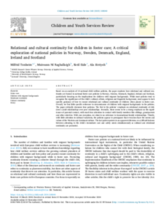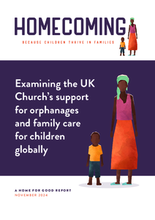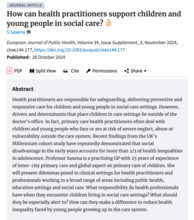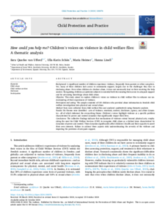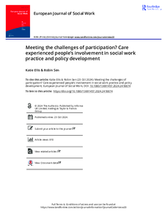

Displaying 61 - 70 of 1643
An analysis of 14 national foster care policies across six European countries found that while most acknowledge children’s cultural, ethnic, religious, and linguistic backgrounds, they provide little concrete guidance on ensuring relational and cultural continuity—particularly for children with migrant backgrounds. The study highlights four policy patterns, including prioritizing adult over peer relationships, emphasizing parental contact over extended family or transnational ties, assuming Western cultural norms, and struggling to balance immediate care needs with maintaining cultural and relational connections.
This is a recording of a presentation Dr. Patricia Lannen, the principal investigator of the “LifeStories project”, delivered during a meeting of the Evidence for Impact Working Group of the Transforming Children's Care Collaborative on 2 October 2024. LifeStories is a 60-year longitudinal study of individuals placed in infant care institutions.
Christians have a long-standing involvement in the care of children, both at home and overseas, with many of those at the forefront of establishing orphanages and residential settings motivated by their faith to take action.
You’re invited to the upcoming webinar Including support for informal kinship care in policy on 6 November at 13:00 UTC. In this webinar, panelists will explore and demonstrate how kinship care can be included in policy and supported without formalisation.
This briefing looks at what data and statistics are available about children in care to help professionals, and the organisations they work for, make
evidence-based decisions.
This study explores risk and resilience in UK school environments for students in kinship care. Eight professionals experienced in working with students in kinship care and their schools took part in individual, semi-structured interviews. Interviews focussed on kinship students’ needs and how professionals perceive schools respond to those needs.
The author of this article is a practising GP with 25 years of experience of inner-city primary care and a global expert on primary care of children and she presents dilemmas posed in clinical settings for health practitioners and professionals working in a broad range of areas including public health, education settings and social care to help reduce health inequality faced by young people growing up in the UK care system.
This study aimed to explore children's voices on violence in child welfare files to enhance our understanding of their experiences of violence. The sample consisted of 120 children who provided abuse information in Swedish child welfare investigations into physical and sexual abuse.
This paper considers attempts to influence practice and policy from the perspectives of 15 care experienced people who had been involved in substantive public campaign work relating to children in state care and care leavers in Scotland and England. Participants shared their experiences of working to influence change and highlighted good and bad practice that they had encountered working with different individuals and organisations claiming to promote the views of those with lived experience.

